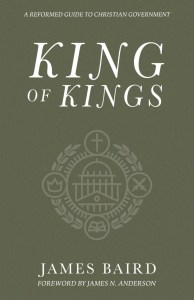A Reformed Guide to Christian Government
 Unless you’ve been on a mission to Mars the last few years, you’ll be aware of the lively public debate over the relationship between religion and civil government, the proper roles of church and state, the place of the Bible in politics, and so on. Too many of the voices in the discussion offer little more than superficial, pugilistic sloganeering, driven more by cultural currents and dueling memes than by sober theological reflection. On the other hand, the best writings on the subject are often beyond the reach of the average layperson; they’re too old, too obscure, too academic, or just too long-winded. That’s why I’m excited about the publication of James Baird’s book King of Kings: A Reformed Guide to Christian Government, released today, which fills a real need at this time.
Unless you’ve been on a mission to Mars the last few years, you’ll be aware of the lively public debate over the relationship between religion and civil government, the proper roles of church and state, the place of the Bible in politics, and so on. Too many of the voices in the discussion offer little more than superficial, pugilistic sloganeering, driven more by cultural currents and dueling memes than by sober theological reflection. On the other hand, the best writings on the subject are often beyond the reach of the average layperson; they’re too old, too obscure, too academic, or just too long-winded. That’s why I’m excited about the publication of James Baird’s book King of Kings: A Reformed Guide to Christian Government, released today, which fills a real need at this time.
Here’s my endorsement:
This is an excellent primer on the proper relationship between government and religion from a Christian perspective. In ten bite-sized chapters, Baird makes a persuasive case that the civil magistrate has a basic duty to promote true religion, namely, Christianity. This is no doubt a provocative thesis in our present cultural moment, but the book makes its argument with an uncomplicated biblical logic and without the kind of strident polemics that so often accompany these debates. It is an argument that, in my view, needs to be revived and reinforced in our day, not least because (as Baird documents) it represents both the mainstream Protestant tradition and the majority position of the American founders. It is a tonic to help cure an epidemic of superficial thinking among Christians about the role of government.
A sample of the book is provided on the publisher’s website. James Baird kindly invited me to write a foreword for the book, which I was delighted to do. Since the foreword is already included in the book sample, I’ve taken the liberty of reproducing it below. Hopefully it will entice you (or provoke you!) to buy and read the full book.
As someone raised in Great Britain, it was impressed upon me from a young age that there are two subjects one should never, never bring up in polite dinner conversation: religion and politics. Certainly, one should not be so ungenteel as to introduce both at once into the discourse. But to bring up religion and politics and then suggest that they are intimately and unavoidably connected? A sure-fire recipe for dining alone.
That said, I suspect most Bible-believing Christians intuitively sense that religion and politics are not only hugely important subjects to think about and discuss, but also ones that cannot easily be kept in hermetically sealed containers, safely insulated from each another. After all, the Bible tells us that what we believe about God and our relationship to Him—the core of religion—is more important than anything else in life. Indeed, eternal life consists in knowing God through Jesus Christ (John 17:3). Moreover, the Bible has significant things to say about politics and closely related matters: the basis for moral law, the healthy ordering of human societies, general principles of justice, the proper role and authority of government, the duties and responsibilities of civil rulers, the relationship of human laws to God’s law, and suchlike. No one who reads the Bible attentively can fail to see that the Christian faith has important implications for the sphere of politics. God’s Word speaks to all of life, and whether we like it or not, politics is a large part of life.
…
 Brandon Smith, archival editor at
Brandon Smith, archival editor at  The Court’s opinion was written by Justice Gorsuch and joined by Justices Roberts, Ginsburg, Breyer, Sotomayor, and Kagan. Justice Alito wrote a dissenting opinion, joined by Justice Thomas. A second dissenting opinion was given by Justice Kavanaugh. All three opinions can be read in full
The Court’s opinion was written by Justice Gorsuch and joined by Justices Roberts, Ginsburg, Breyer, Sotomayor, and Kagan. Justice Alito wrote a dissenting opinion, joined by Justice Thomas. A second dissenting opinion was given by Justice Kavanaugh. All three opinions can be read in full 

